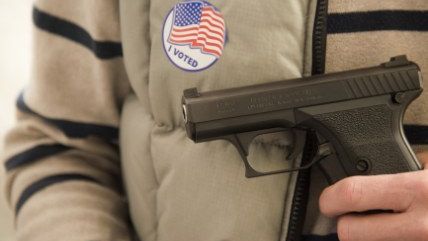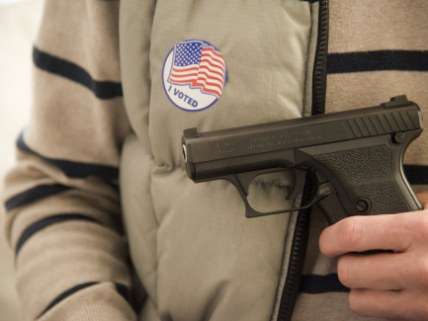Trump Took a Break from Fearmongering to Approve Good Gun Rights Bill
Due process protections preserved for those getting Social Security benefits.


President Donald Trump signed a measure yesterday striking down a gun control regulation that compromised the rights of a small group of people on the basis of being classified by the Social Security Administration as having a mental illness.
The bill has been widely misinterpreted and misunderstood, possibly deliberately so. Brian Doherty in early February noted how media and gun control advocates presented this bill as something that would put weapons in the hands of severely mentally ill people.
That's not what the initial regulation did at all, and Trump signing this measure doesn't actually give extremely mentally ill people the federal stamp of approval to go stockpile weapons. This regulation, organized via executive action under President Barack Obama, used lists of people on Social Security who have been diagnosed with mental illnesses and also have others handling their finances as a blanket mechanism to potentially deny them gun purchases.
Such a system turns concepts of due process and the right to self-defense on their heads. Those who would have gotten caught up in this list—an estimated 75,000-80,000 of them—would have to fight the federal government to prove that they were not a danger and should be allowed to retain their gun rights. This is the reverse of how it should work. The government is supposed to prove that a particular person's mental illness is a disqualifying factor, not just use inclusion on some government list as shorthand.
Thus, this rule was opposed not just by the National Rifle Association, but by more than a dozen groups that represent the interests of people with disabilities and mental health issues. The American Civil Liberties Union (ACLU) also opposed it. They all understood this wasn't really a fight about keeping guns out of the hands of dangerously mentally ill; it was about using bureaucratic tools and data to pre-emptively deny people their rights and then making them fight with the government to prove they should have these rights restored.
Yet not two weeks after the due process problems of these gun restrictions were explained, the New York Times editorial board completely ignored the background and acted like this effort to rescind the rule was a conspiracy between the Republicans and the National Rifle Association (NRA). The headline, "Congress Says, Let the Mentally Ill Buy Guns," should be perceived at this point as a deliberate choice to mislead the reader. At no point at the editorial does it even reference the due process concerns or acknowledge that the ACLU and NRA (and several groups with no connection to gun ownership controversies) are all on the same side here. Democrats who voted with the GOP are dismissed on the basis of being "up for re-election next year."
If these were any other issue other than gun ownership, have no doubt that the brilliant minds of the Times editorial crew would fully grasp the due process concerns. If the feds used such a list to try to deprive people of other types of property, the Times would certainly see the constitutional implications here.
But it's guns, and when guns are involved some folks would prefer to ignore not just the Second Amendment, but the Fourth as well. That's what brought us all the awful "No Fly, No Buy" movement, where Democratic leaders attempted to deny people's right to own guns on the basis of their inclusion on the government's extremely secretive terror watch lists and "no fly" lists. The ACLU, who has been fighting the government over the no-fly lists, also opposed using such a system to deny guns because of the lack of due process.
Trump, interestingly enough, also declared support during the campaign for using terror watch lists to deny gun rights, so it's relevant that he signed on here to preserve due process rights over fearmongering about violence. He certainly didn't show much interest in due process in his address last night. Nevertheless, he did the right thing here.
That terrible Times editorial came to mind when watching this hilariously bad NRA commercial attacking the newspaper's coverage. The Times decided to run ads during the Academy Awards on Sunday, and this NRA ad attempts to mock it for its claims of being vanguards of the truth. The ad is "hilariously bad" because it falls into a familiar trap of media criticism—it claims that the Times and "elite media" are not covering stories while using clips of those events, presented by the media itself. It's not unusual to see somebody complain on social media that the "mainstream media" isn't covering something attached to a link to a news story from a major outlet about that very thing.
But to the extent the NRA's ad strikes a nerve it's because of factors like this terrible editorial the Times published that deliberately conceals and ignores the full context and potential consequences of the terrible regulation they're defending. People who understand guns (heck, even people like me who know little about guns but are big on due process) see the constant mistakes and misrepresentations of issues related to gun ownership, and they remember this stuff. That editorials and opinions are separated from news coverage doesn't excuse these factual misrepresentations, especially when it looks like it's deliberate, as it does here.


Show Comments (38)